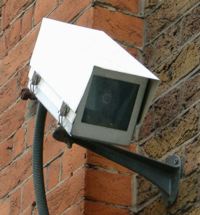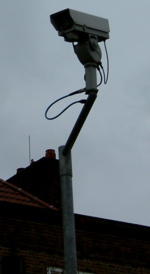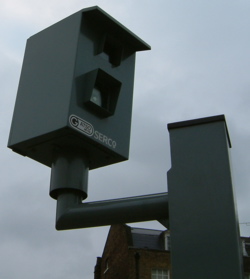We are developing the social individualist meta-context for the future. From the very serious to the extremely frivolous... lets see what is on the mind of the Samizdata people.
Samizdata, derived from Samizdat /n. - a system of clandestine publication of banned literature in the USSR [Russ.,= self-publishing house]
|
In a characteristic Samizdata posting, Perry de Havilland regrets the modern use of the phrase “Big Brother” to describe reality TV shows, and harks back to Orwell’s original coinage, with grim pictures of CCTV surveillance cameras outside primary schools, and of propaganda for CCTV cameras in the form of big posters in the London Underground.
All this anti-surveillance thinking over at Samizdata is connected to the recent launch of this new blog, which will be concerned with civil liberties and “intrusive state” issues. I’ve already done a couple of posts here, the most substantial of which concerned organ donorship, and I intend to contribute many more similar efforts. The boss of White Rose is one of my closest friends.
However, I have long been nursing heretical thoughts about this total surveillance stuff, which it makes sense to put on a “culture” blog rather than on a politics blog. Because what I think is at stake here is a sea change not just in state surveillance, but in the culture generally. What is more, it is a sea change which places programmes like Big Brother right at the centre of what is happening. → Continue reading: Reflections on “Big Brother”: the total surveillance society and the prescience of popular culture
From what I have observed over the years, one of the things in the world that annoys lefties more than almost anything else in the world is a somewhat drunk and somewhat old guy singing My Way, the song made famous by Frank Sinatra.
The reason people sing it is because they understand freedom and what freedom is all about. The right to do things your way, your pride when you have, the fact that this will involve mistakes, but so what? That’s what the song is all about and we all know it.
And that’s why lefties hate it so. For them, it is the sound of defeat. It is the sound of people who have consciously and deliberately turned their backs on lefty bullshit and have decided to do things their way, as often as not with their own money.
Ask yourself this. How often do they get drunk and sing this song at NGO/tranzi conferences? Not often is my guess, or if so only with post-modern irony, which doesn’t count.
So, thanks to Dave Barry for linking to this story, which shows that in the Philippines people take this song seriously, just as people do everywhere else. Basically someone wasn’t singing the song very well, and was stabbed to death.
And now, the end is near;
And so I face the final curtain. …
He sang more truly than he knew.
The telescreen received and transmitted simultaneously. Any sound that Winston made, above the level of a very low whisper, would be picked up by it; moreover, so long as he remained within the field of vision which the metal plaque commanded, he could be seen as well as heard. There was of course no way of knowing whether you were being watched at any given moment. How often, or on what system, the Thought Police plugged in on any individual wire was guesswork. It was even conceivable that they watched everybody all the time. But at any rate they could plug in your wire whenever they wanted to. You had to live – did live, from habit that became instinct – in the assumption that every sound you made was overheard, and except in darkness, every movement scrutinised.
– George Orwell, from 1984
Today is George Orwell’s birthday. Happy birthday George, you were right… just a few years too early. And now we have thermal imagers which means even darkness is no shield from the Panopticon State.

Nah! You must be paranoid! It’ll never happen here!
The telescreen received and transmitted simultaneously. Any sound that Winston made, above the level of a very low whisper, would be picked up by it; moreover, so long as he remained within the field of vision which the metal plaque commanded, he could be seen as well as heard. There was of course no way of knowing whether you were being watched at any given moment. How often, or on what system, the Thought Police plugged in on any individual wire was guesswork. It was even conceivable that they watched everybody all the time. But at any rate they could plug in your wire whenever they wanted to. You had to live – did live, from habit that became instinct – in the assumption that every sound you made was overheard, and except in darkness, every movement scrutinised.
– George Orwell, from 1984
Today is George Orwell’s birthday. Happy birthday George, you were right… just a few years too early. And now we have thermal imagers which means even darkness is no shield from the Panopticon State.

Nah! You must be paranoid! It’ll never happen here!
BBC reports that Home Secretary David Blunkett is to give details on how two million people are about to be listed on a national DNA crime database. The government originally said in 2000 that it wanted to have three million personal profiles on the system by 2004. This was thought to be the whole of the “criminal class”.
The arguments for such a national database are new figures that suggest it is increasingly obvious DNA evidence can be a potent weapon against all categories of crime. The last three years have seen a 50% increase in the crimes solved using DNA samples.
At the moment, only those charged with an offence have their samples taken, but the government’s Criminal Justice Bill plans to give police powers to take samples from anybody who has been arrested.
Both civil liberties campaigners and some scientists warn that with a potentially vast database, the possibility of somebody being wrongly linked to a crime would grow. DNA evidence is not infallible, with forensic experts evidence referring to the probability of match rather than a definite match.

Mr Prodi is not amused. The UK government’s decision on the euro had disappointed him. Oh dear. He probably can’t wait to get his hands on UK affairs himself.
The EU chief also reckons that it was a signal of deep political problems. He is right there. The EU has deep political problems. No wait, he meant the UK – it appears that he doubts the wisdom of the direction our reverent Tony Blair has taken over the euro.
Prodi acknowledged that Tony might have had a tough time winning a referendum but he said he did not know whether the prime minister’s decision was due to political wisdom or a lack of courage. Of course, Prodi does not worry about referendums, you just keep having them until they say ‘yes’.
And finally, Mr Prodi warns that Britain cannot remain half in and half out of Europe. Oh good. Let’s get out then…

All UK mobile phone operators now track the locations of cellphones, according to this BBC piece. The technology was built in order to provide mobile phone users with information about nearby services: dial a number and ask for the nearest Mexican restaurant, for example. But providers are beginning to offer reverse location lookups, so others can track the location of a particular phone, or send text messages to people in a particular area.
“All the big four operators now offer a commercial service so you can send them a telephone number and they will tell you where it is,” said Colin Bates, chief technology officer at location services company Mobile Commerce.
[…]
But location-based services are going to be much more common, now that locations can be requested for a few pence a time and firms such as Mobile Commerce and Verilocation are springing up to funnel location requests to the various networks.
The location system works best in urban areas covered by lots of base stations that have overlapping coverage. This lets operators give a location fix accurate to about 200 metres.
Providers are quick to point out that they won’t release information about a phone’s location without permission from the owner. Except if you’re a law enforcement officer, of course, or a corrupt employee, or a skilled social engineer, or the rules change..
Soon Verilocation plans to offer a service for families that lets worried parents find out where their offspring are. The service will cost a fixed amount every month and let family members check locations a few times per month.
Mr Overton said Data Protection legislation means that tracking cannot be done without consent of a handset owner.
– BBC, Being tracked down by your mobile.
Verilocation’s web page has some more information on how the process works, but there are no technical details.
The opportunity for abuse of such a capability is particularly alarming in a government-controlled monopoly such as telecommunications. The lengths to which network operators will go to please their state protectors was illustrated recently when it was revealed that UK government departments make 1 million requests for phone records each year. Service providers hand over as many as 100 million call records each year in order to maintain a good relationship with police and other investigatory agencies.
Cross-posted from Vigilant TV
Never mind San Francisco or Hampstead, Brussels is the true home of the radical student left. Still as committed as ever to the anti-ismism crusades of the 1980’s, they continue to dig away at the foundations of our ‘bourgeois values’.
Seems they have just struck another seam:
The Commission is in the final stages of drawing up a directive to ban sex discrimination, with implications for the media, advertising and insurance industries.
The draft directive, revealed in Tuesday’s Financial Times, would leave it to the courts to decide whether programmes or advertisements were sexist or “did not respect human dignity”. An explanatory note says: “The purpose of this provision is to avoid throughout all forms of mass media all stereotypical portrayals of women and men, as well as any projection of unacceptable images of men and women affecting human dignity and decency in advertisements.”
The law could have profound implications for institutions such as Britain’s topless Page Three girls in The Sun newspaper and vast swathes of Italian television. Advertisers using sex to sell could also be affected.
If it wasn’t so offensive and inappropriate, I’d say that they’ve just discovered a motherlode.
The real devil in this detail lies with the apparently reasonable proposition to ‘leave it to the Courts’ thereby providing a fig-leaf of objective justice. Actually, though, this is a charter and blessing for looney-left activists to drag any number of advertising agencies and media companies through any number of Courts on pretty much any pretext they damn well please (as these things are usually drafted in the widest and vaguest possible terms).
However, in practice, this will only need to be done once or twice for the wicked capitalists to get the message and, in order to avoid the risk of a ruinous lawsuit, start censoring themselves. That is the ideal solution because why bother with all that messy and troublesome enforcement business when life is so much easier for the ruling elite if everyone just internalises their own repression.
The European Union: if it didn’t exist, we would not have to invent it.
When I was in Spain a couple of weeks ago, I paid for most things with cash, and I only used credit cards occasionally. The first time I did so was when I wished to buy a ticket for the Bilbao Guggenheim museum. Upon handing over my Visa card, I was asked for identification. I did what I usually do when I encounter a request of this nature that I am not used to. I smiled, complied with the request by getting out my driver’s licence and handing it over, and asking “Why?”.
The lady behind the counter looked briefly at me, and explained that things were done differently in different countries, and that in Spain they liked to check identification rather than a signature, because signatures are easy to forge and an identification cheque reduces fraud.
As far as it goes, this is probably true. It probably does reduce fraud. (On the other hand, a signature on a credit card slip is as much about making a contract legal as it is about identification. The reason we use such a flimsy means of identification is that the signature requirement wasn’t originally about identification). However, in this particular instance, an identity check was completely unnecessary. I do not expect that many people use stolen credit cards to buy tickets to art museums. However, the custom of asking for identification when credit cards are used in Spain is ingrained, so that it occurs even when it doesn’t make a great deal of logical sense. (I have occasionally been asked to produce identification in Australia and the UK when using credit cards to pay for expensive items of the sort that might be of value to thieves – for instance the laptop computer I am typing on now – but it only seems to happen when it does make some kind of logical sense).
A second thing that I observed in Spain was that a driver’s licence was not the sort of ID they really wanted to see. It was okay in the museum, but later on it became clear that what they meant by “ID” was my passport, although I could probably get away with a driver’s licence because I was a foreigner. In the case of Spanish people, what they wanted to see was a national ID card. Because everyone has to carry one of these around with them, the card’s use has expanded to the point that it is difficult to use a credit card without one. I don’t know precisely what the role of the compulsory ID card is under Spanish law, but Spanish people seem to need it to go about their day to day lives.
Of course, Spain actually was a fascist state until the mid 1970s, and quite probably the actual point of the card was that it would be needed for people to go about their day to day lives. I think the point may be that once such a card is in place and its use is part of everyday life, it is very hard to get rid of it. For that reason, introducing such a card is really not something to be done lightly.
New Scientist has an article about the launch of a global internet laboratory, PlanetLab, that simulates tens of thousands of virtual users at more than 60 companies and universities.
It will be used to test new weapons for fighting internet worms and to develop better distributed computer programs, i.e. those that operate on many machines at once. It will also be used to engineer smarter protocols for the next-generation internet. Shankar Sastry, at UC Berkeley says:
The PlanetLab test bed will be an important addition to cyber security research efforts across the country. The ability to conduct cyber-security research on a global scale will have major consequences.
This is wonderful stuff. I am not an expert and cannot tell whether these kind of simulations can be accurate enough to be relevant to the real world battle for cyber-security. Probably yes. What I love about it is people coming together pushing the bounderies of technological progress. Never satisfied with the cutting edge, always reaching for the bleeding edge. That is part of our Western capitalist tradition.
The occasion of this unexpected eulogy to technology and progress was this bit of news read in the conjuction with the above article:
The Pakistani newspaper, The News, quoted a Taliban spokesman as saying Mullah Omar announced the formation of the body [ed. Rahbari Shura, leadership council] in an audio tape sent from his hiding place in Afghanistan. In the tape, Mullah Omar called on the Taliban to make sacrifices to drive out U.S. and other foreign troops and the “puppet” government of U.S.-backed President Hamid Karzai:
Now jihad will be waged against the U.S. and allied forces under a new military strategy.
This is bad news, not because Mullah Omar is frightening me, but because more deluded young muslims will latch onto his fundamentalist railings and die needlessly. What struck me was that this raving fundo uses audio tapes to broadcast his callings for jihad and extermination of Westerners. The technology would probably have never been invented had his ilk had their way. It is the very civilisation and culture he fights so benightedly, that enables him to be heard and spread his poisonous propaganda. Fortunately, Western civilisation fosters progress and innovation and will in the end win the unequal battle.
To be honest I have never understood what the fascination people have with so-call ‘reality TV’ programmes like Big Brother. I have forced myself to watch a couple times and ended up despairing for the future of western civilization. Suddenly my taste for explosion filled action movies and lycra clad starlets with guns does not seem so low-brow after all.

Oooo! Very exciting!
No doubt some of our faithful commenters will put me right on this area of complete disconnection between me and this baffling area of popular culture.
But maybe this Disneyfication of the entirely unfunny term ‘Big Brother’ that George Orwell coined will soon be coming to an end.
Then maybe we can start getting more people frowning with concern rather than smiling vacuously at the sound of the words ‘Big Brother’. Why bother watching the TV to see a bunch of self-absorbed cretins in a room back-stabbing each other when you can be in your very own rolling endless episode of ‘Big Brother’ by just walking down almost any CCTV filled high street in Britain?
Here is some real reality TV, staring… you.
 


Cross posted from: Samizdata.net
A new speed camera installed at the urging of Robert Marshall, a Conservative on South Staffordshire district council has caught its first few victims, one of whom was… Robert Marshall.
The Tory speed demon was nailed doing a whopping 43mph in a 30mph limit.

Gotcha, you Tory bastard!!!
Cross posted from: Samizdata.net
|
Who Are We? The Samizdata people are a bunch of sinister and heavily armed globalist illuminati who seek to infect the entire world with the values of personal liberty and several property. Amongst our many crimes is a sense of humour and the intermittent use of British spelling.
We are also a varied group made up of social individualists, classical liberals, whigs, libertarians, extropians, futurists, ‘Porcupines’, Karl Popper fetishists, recovering neo-conservatives, crazed Ayn Rand worshipers, over-caffeinated Virginia Postrel devotees, witty Frédéric Bastiat wannabes, cypherpunks, minarchists, kritarchists and wild-eyed anarcho-capitalists from Britain, North America, Australia and Europe.
|












